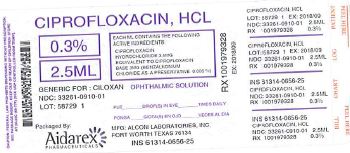
Ciprofloxacin Hydrochloride Solution/ Drops while Breastfeeding
What is Ciprofloxacin Hydrochloride Solution/ Drops used for?
I am currently breastfeeding and I want to know if using Ciprofloxacin Hydrochloride Solution/ Drops is safe for my kid? Does it have any effect on milk production?

Nursing Mothers It is not known whether topically applied ciprofloxacin is excreted in human milk; however, it is known that orally administered ciprofloxacin is excreted in the milk of lactating rats and oral ciprofloxacin has been reported in human breast milk after a single 500 mg dose. Caution should be exercised when Ciprofloxacin Hydrochloride Ophthalmic Solution is administered to a nursing mother.
Ciprofloxacin Hydrochloride Solution/ Drops Breastfeeding Analsys
Ciprofloxacin while Breastfeeding
SafeCAS Number: 85721-33-1
Quinolone-related medication has been used in neonates and infants without known side effects. It is excreted in tiny amounts into breast milk. Absorption through the child’s gut may be interfered by calcium in the milk. Should it be prescribed to a nursing mother Norfloxacine, Ofloxacine and Ciprofloxacine are to be chosen since they have shown a lowest excretion into the milk. One case of pseudomembranose colitis, possibly related to mother ingestion of Ciporfloxacine, in a premature infant has been described who previously was affected of NEC, Follow-up for diarrhea in the infant is warranted. Be aware of false negative bacterial cultures in the infant when the mother is on antibiotics. The American Academy of Pediatrics rates it compatible with breastfeeding.
Ciprofloxacin Hydrochloride Solution/ Drops Breastfeeding Analsys - 2
Ciprofloxacin while Breastfeeding
CAS Number: 85721-33-1
Amounts of ciprofloxacin in breastmilk are low. Fluoroquinolones such as ciprofloxacin have traditionally not been used in infants because of concern about adverse effects on the infants' developing joints. However, studies indicate little risk.[1] The calcium in milk might decrease absorption of the small amounts of fluoroquinolones in milk,[2] but, insufficient data exist to prove or disprove this assertion. Use of ciprofloxacin is acceptable in nursing mothers with monitoring of the infant for possible effects on the gastrointestinal flora, such as diarrhea or candidiasis (thrush, diaper rash). Avoiding breastfeeding for 3 to 4 hours after a dose should decrease the exposure of the infant to ciprofloxacin in breastmilk. Maternal use of an ear drop or eye drop that contains ciprofloxacin presents negligible risk for the nursing infant. To substantially diminish the amount of drug that reaches the breastmilk after using eye drops, place pressure over the tear duct by the corner of the eye for 1 minute or more, then remove the excess solution with an absorbent tissue.
I am nursing mother and I have already used Ciprofloxacin Hydrochloride Solution/ Drops, what should I do?
It is always a good idea to keep your healthcare provider or doctor informed about your drug usage during pregnancy and breastfeeding but if you have not informed your doctor about Ciprofloxacin Hydrochloride Solution/ Drops and have used it then do not panic as Ciprofloxacin Hydrochloride Solution/ Drops is mostly safe in breastfeeding and should not cause any harm to your baby.
My health care provider has asked me to use Ciprofloxacin Hydrochloride Solution/ Drops, what to do?
Definitely, Ciprofloxacin Hydrochloride Solution/ Drops is safe in lactation for baby. No wonder your doctor has recommended it.
If I am using Ciprofloxacin Hydrochloride Solution/ Drops, will my baby need extra monitoring?
No extra baby monitoring required while mother is using Ciprofloxacin Hydrochloride Solution/ Drops
Who can I talk to if I have questions about usage of Ciprofloxacin Hydrochloride Solution/ Drops in breastfeeding?
US
National Womens Health and Breastfeeding Helpline: 800-994-9662 (TDD 888-220-5446) 9 a.m. and 6 p.m. ET, Monday through Friday
UK
National Breastfeeding Helpline: 0300-100-0212 9.30am to 9.30pm, daily
Association of Breastfeeding Mothers: 0300-330-5453
La Leche League: 0345-120-2918
The Breastfeeding Network supporter line in Bengali and Sylheti: 0300-456-2421
National Childbirth Trust (NCT): 0300-330-0700
Australia
National Breastfeeding Helpline: 1800-686-268 24 hours a day, 7 days a week
Canada
Telehealth Ontario for breastfeeding: 1-866-797-0000 24 hours a day, 7 days a week
